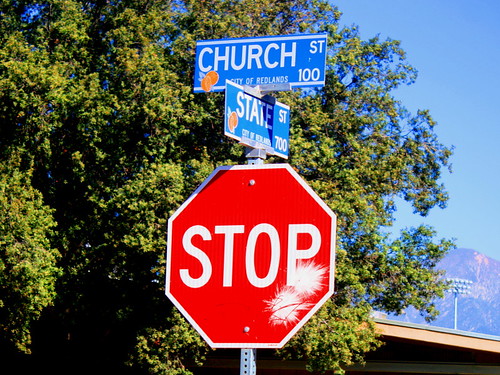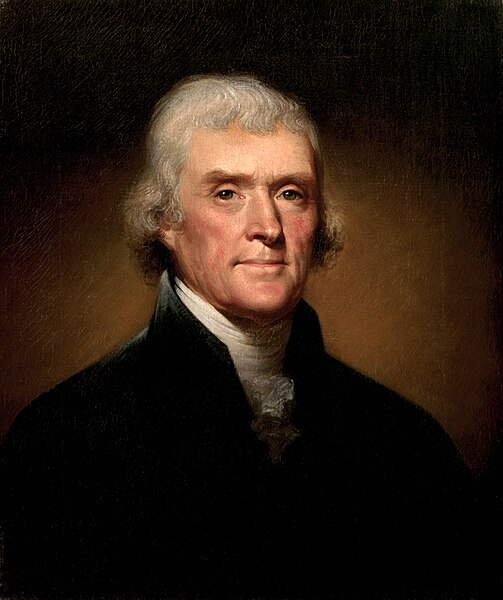There’s a war on! Have you heard? No, it’s not the war in Afghanistan, nor the War on Terror. It’s not the War on Drugs, nor even the War on Poverty. Oh, no.
There’s a much more surreptitious threat. A threat to something more fundamental and—gasp!—fundamentally American. It’s the Obama administration’s secret “War on Religion"!
 |
| The intersection of Church and State. (Photo by Chuck Coker via Flickr. Used under Creative Commons license.) |
But is this reconstruction of America's nascent principles, and Obama's alleged attack upon them, true to the historical record? A cursory review of the life and politics of Thomas Jefferson, Founding Father and writer of the Declaration of Independence, returns results that will no doubt surprise many 21st century American conservatives.
The "War on Religion" in the GOP Presidential Primary
The “War on Religion” has a familiar flavor: allegations of the President's alleged anti-religious agenda have a seamless continuity with Fox News’s annual “War on Christmas” coverage. Christmas comes but once a year, but the outrage over President Obama’s secular approach to governance now has enough staying power to last all year. It's a Christmas miracle!
Naturally the rallying cry against “secularist” discrimination has worked its way into the Republican Presidential Primary, first garnering national attention through Texas Governor Rick Perry’s ill-advised and widely-parodied Iowa campaign ad, “Strong”:
Since Perry's departure from the race, former Speaker of the House Newt Gingrich has picked up the banner and carried it forward, accusing the Obama administration not only of a War on Religion, but more specifically a War on Christianity.
Focusing on anti-discrimination legislation, fallout from Obama’s landmark health-care reform bill, and the outcome of a handful of court cases (assumedly the responsibility of Obama by proxy), Gingrich has sought to depict the President as a secularist crusader seeking to expunge religion not just from public life, but American culture at large.
After finding his groove in South Carolina, Gingrich hoped to push the message among evangelicals in Florida. Speaking on a conference call with Christian pastors around the state, Gingrich declared:
I think we are in a war against religion. I think the elites are bigoted secularists. I think we have judges who are dictatorial. I think we have constant pressure against religious expression.While Gingrich's evangelical strategy failed to produce electoral results in Tuesday's Florida primary (winning just 2% more of self-identified evangelical voters than Romney and losing the race by 14.5%), many columnists believe that Gingrich's "War on Religion" strategy may have staying power. As Sarah Posner at Religion Dispatches explains:
Their antipathy toward Obama—an antagonism that is deeply wrapped up in the belief that he is a fake Christian, or worse, a Muslim seeking to rob them of their religious freedom—will drive them to the polls. We haven't heard the end of the "war on religion." It’s just the beginning.They are Legion?
For the harbingers of secularist doom, the United States is a war zone, and anti-religion foot soldiers are legion.
 |
| The prayer banner protested by a young atheist in in Rhode Island. |
Most recently, we've heard outcry from conservative evangelical and Catholic organizations over an Obama administration rule that requires all employers, including those which are religiously-affiliated, to include coverage of contraception as part of their health plans, a decision which the United States Conference of Catholic Bishops has already promised to challenge in court.
Gingrich eagerly jumped on board:
Indirectly quoting Catholic Cardinal Timothy Dolan, Gingrich declares that the new Obama administration rule is "is a direct assault of freedom of religion in America and a complete violation of our First Amendment rights."
Certainly our Founding Fathers, who—as the argument goes—founded the United States as a “Christian nation” would be appalled!
Wouldn’t they?
The Jefferson Bible and Religious Freedom
This past weekend, I had the fortunate opportunity to visit the Thomas Jefferson's Bible exhibit at the National Museum of American History here in Washington, D.C.
 |
| The Life and Morals of Jesus of Nazareth (aka the Jefferson Bible) |
"Shake off all the fears of servile prejudices, under which weak minds are servilely crouched. Fix reason firmly in her seat, and call on her tribunal for every fact, every opinion. Question with boldness even the existence of a God; because, if there be one, he must more approve of the homage of reason than that of blindfolded fear." —Thomas Jefferson, 1787Jefferson was a student of the Enlightenment. As Henry R. Rubenstein and Barbara Clark Smith explain in their introduction to the history of the Jefferson Bible, "Jefferson and many of his correspondents embraced the exhilarating prospect of liberating their contemporaries' minds from inherited misconceptions and superstitions."1 He believed human reason might be applied to evaluate the presupposed laws of human nature and the human institutions of society and government.
Religion was no exception. Jefferson argued that both imperfect record keeping and the scheming of power-hungry men resulted in "sophisticating and perverting the simple doctrines [Jesus] taught." Some of these "perversions" were evident to Jefferson in the New Testament text. Thus the production of the Jefferson Bible.
Jefferson's War on Religion?
While he is today remembered as the heroic author of the Declaration of Independence and a staunch supporter of the Bill of Rights, Jefferson's contemporaries did not view him through the same rose-colored glasses of a 21st century American patriot. To the contrary, many viewed his religious beliefs, and the political opinions with which they were intertwined, as a great danger to a burgeoning American republic.
In line with Jefferson's belief that even religion was subject to the scrutiny of human reason came the conviction that religion is a deeply personal and even private experience, and one thought out to be free from incursions by the coercive power of government-supported institutions.
 |
| "No man can conform his faith to the dictates of another. The life and essence of religion consists in the internal persuasion or belief of the mind." —Thomas Jefferson, 1776 |
Jefferson took these action within the context of a state that was attempting to suppress gatherings of non-Anglican protestant sects, threaten dissenting preachers with the force of law, and limit the intellectual exchanges of professors at William & Mary College.
Unsurprisingly, Jefferson met with staunch opposition from not only Anglicans, but also those who believed in the importance of an alliance between church and state. Despite writing extensively about God as Creator in various pamphlets and the Declaration of Independence, Jefferson's fight for religious freedom entailed "the severest conflicts in which I have ever been engaged," during which his religious beliefs and personal character were relentlessly questioned.3
The eventual success of Jefferson's legislation in 1786 did nothing to dissuade his opponents. Rather, as Rubenstein and Smith explain, it "created bitter enemies and a broad public readiness to see its author as hostile not only to religious establishments, but to religion itself."
In his own defense, Jefferson pointed directly back to his view that faith was a private matter, and that the faith of his fellow American bothered him not in the slightest:
"It does me no injury for my neighbor to say there are 20 gods or no God. It neither picks my pocket nor breaks my leg." —Thomas Jefferson, 1784Though he was attempting to demonstrate the negligible effect another individual's religious beliefs on his own life and liberty, Jefferson's opponents took his words as something else: a fundamental challenge to the value of religion in general. "Jefferson increasingly found himself charged with being an infidel, atheist, or worse," write Rubenstein and Smith, "not only unchristian, but anti-Christian in his aspirations.4.
Jefferson, they would have you believe, was waging something of a war on religion. Hm.
In what is perhaps a quintessential example of "the more things change, the more things stay the same," Jefferson's religion (or rather his alleged fight against it) became a major campaign issue during the presidential election of 1800. Religion played a prominent role, with Jefferson under almost constant attack from members of the religious community.
Clergymen from states maintaining pre-Revolutionary arrangements with churches (wherein congregations often received taxpayer money and support from state authorities) viewed Jefferson's political stances as a threat to their privileged arrangements. Some clergymen told parishioners that they should hide their Bibles should Jefferson become President. Others went as far as to depict Jefferson as antagonistic toward religion as a whole:
"[The] election of any man avowing the principles of Mr. Jefferson would ... destroy religion, introduce immorality and loosen all the bonds of society." —Rev. William Linn, in a widely distributed pamphlet during the 1800 presidential election5These allegations against soon-to-be-President Thomas Jefferson bear a striking similarity to the attacks of Newt Gingrich and his allies against President Obama. The difference? No one dared allege that Jefferson's policies somehow perverted the intentions of the Founding Fathers.
After all, he was one.
Jefferson's Bible, Religious Freedom and the "War on Religion"
"I am a Christian, in the only sense in which [Jesus] wished any one to be; sincerely attached to his doctrines, in preference to all others; ascribing to himself every human excellence, and believing he never claimed any other." —Thomas Jefferson, 1803While Thomas Jefferson certainly identified as a Christian, an exploration of his philosophical writings, intellectual correspondences, and especially his personally crafted Bible reveal a version of Christianity that many 21st evangelicals would consider apostasy. His personal Bible was a literal incarnation of the dreaded "cafeteria Christianity" that many fundamentalists and evangelicals so frequently malign.
The purpose of this article is not to evaluate the authenticity of Jefferson's Christian faith. (He himself openly admitted, "I am of a sect by myself, as far as I know," in 1819.)
Instead it seeks to evaluate critically the claim by Newt Gingrich and others on the Religious Right that Obama is waging a "war on religion" that is somehow an assault against the principles of the Founding Fathers.
To the contrary. Our Founding-est of Fathers, he who penned the Declaration of Independence, the very birth certificate of this great nation, was a strong proponent of religious freedom.
He, too, was accused of harboring "anti-Christian" sentiments.
He, too, was accused of supporting policies that could "destroy" religion.
He, too, waged what his conservative Christian contemporaries might have labeled a "war on religion."
For Jefferson, Christianity was not the cornerstone of our republic. This was not a "Christian nation." This was a nation founded upon the Enlightenment principles of reason and scientific inquiry, and he envisioned a society that encouraged individuals to challenge the intellectual trappings of the status quo and to think as freely and independently as they lived.
So next time a conservative challenges President Obama's "War on Religion," or insinuates that he is somehow undermining our founding principles through a secular approach to federal governance, reflect on the life and writings of Thomas Jefferson, author of the Declaration and strong supporter of the Bill of Rights.
And then ask yourself, who is really waging war against the intentions of our Founding Fathers? Who is really fighting against the principles upon which this great nation was founded?
Turns out, Newt's right. There is a war on. It's just not the war he's selling.
---
1 Harry R. Rubenstein and Barbara Clark Smith, "History of the Jefferson Bible," in The Jefferson Bible: the life and morals of Jesus of Nazareth extracted textually from the Gospels in Greek, Latin, French & English, by Thomas Jefferson (China, Oceanic Graphic: 2011), 17.
2 Ibid., 13.
3 Ibid., 13.
4 Ibid., 16.
5 Ibid., 20.
bravo, and well written!
ReplyDeletenever saw "assumedly" before; in the next dictionary?
good thing the first generation preserved it's "birth certificate"...